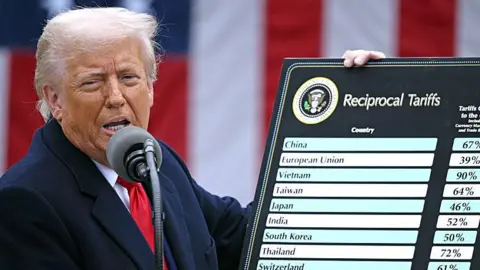In the realm of international trade, global dynamics are shifting dramatically, and a recent ruling has positioned President Donald Trump’s controversial tariff policy at a crossroads. Renowned economics editor Faisal Islam from BBC News articulates these pivotal changes, primarily stemming from a significant legal decision regarding Trump’s approach to tariffs aimed at foreign goods and services. This ruling not only undermines Trump’s existing trade policies but also raises fundamental questions about executive authority, congressional powers, and the future of trade negotiations.
The crux of the controversy took shape in California, where Democratic Governor Gavin Newsom spotlighted the legality of Trump’s sweeping tariffs. The case brought forth by the International Trade Court presented by various states and small businesses underscored potential illegality in the manner Trump exercised his authority to impose tariffs. This ruling challenges the very fabric of Trump’s trade war strategy, indicating that the anticipated reciprocal tariffs, scheduled for implementation in July, may be rendered ineffective.
Historically, trade policy in the U.S. is a Congressional prerogative, suggesting that Trump’s unilateral tariff hikes may have overstepped constitutional boundaries. The president’s declaration of imminent national emergencies to justify a range of tariffs has been called into question. Challenges to this executive overreach could result in a precedent that curtails the latitude enjoyed by future administrations regarding trade authority, especially in the context of emergency declarations.
Islam elaborates on the intricacies of trade legislation, noting how former President Richard Nixon’s limited use of emergency powers contrasts sharply with Trump’s expansive interpretations. The dilemma is not only political but deeply rooted in legal precedent and constitutional interpretation. The arguments posited in the courts echo the foundational principles laid out in the Federalist Papers by Hamilton and Madison concerning the separation of powers.
The decision trailed by the courts explicitly states that the president’s use of tariffs as leverage in trade negotiations does not align with constitutional mandates. The legal argument goes further to point out that tariffs cannot simply be used to rectify trade deficits or create bargaining positions, which disrupts Trump’s assertions about the “art of the deal.” This legal scrutiny reflects broader implications for the international trading environment, as it sets a precedent that may embolden other nations to challenge tariffs levied by the U.S.
The fallout from the ruling could rile the delicate fabric of trade relations, particularly with allied nations like the UK and Japan, who, according to Islam, are already hesitating due to the uncertainty surrounding U.S. tariff strategies. Domestically, U.S. retailers and manufacturers are bracing themselves for inflationary pressures and potential shortages due to the impracticalities associated with ongoing tariff disputes. The immediate economic implications are already manifesting, as companies face mounting financial constraints exacerbated by the tariffs.
Moving forward, the White House is caught in a web of complexities regarding whether to seek Congressional approval for the tariffs or pivot to alternative legal bases that might facilitate different tariff structures. Whether Congress will rally behind Trump remains doubtful, particularly amid rising public scrutiny of the economic impact associated with tariffs. This scenario has allowed for the possibility of a more measured diplomatic approach among trading partners who now have the legal backdrop to press U.S. policy-makers on the consequences of their tariffs.
Ultimately, the recent court ruling is set to influence the future of international trade negotiations, as negotiators worldwide may adopt a wait-and-see stance while the U.S. administration grapples with the legality of its ongoing trade policies. The implications for business operations within the U.S. and its foreign relations could be profound as the administration strives to navigate these legal challenges while simultaneously addressing the pressing economic realities on the ground.



